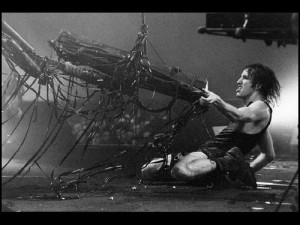Arcade Fire Brings The Heat And Tops The Charts With Reflektor
November 11, 2013
Despite conquering the top 200 charts across the board, Arcade Fire’s Reflektor has some fans divided. Die-hards and otherwise issue praises and criticisms of the band’s latest venture, their first album since The Suburbs in 2010. The band’s hipster-friendly tunes haven’t quite disappeared into another form of Arcade Fire, but rather expanded into a broader sound, and their strong points are highlighted by moments of exploration. Where there was synchronicity throughout their previous albums that kept them in a safer zone, as in Funeral, Reflektor offers a more haphazard, freewheeling feel, in structure and musicality.
In all, this different, more expansive, genre-spanning Arcade Fire is something worth listening to.
Beginning with the album’s title track, “Reflektor” starts the album with something a little unusual. Slow-walkable disco beats introduce the tune while Win Butler spins lyrics about love and personal distance. The band’s lyricism is really exemplified early on, with Butler singing lines such as “Alone in the darkness, darkness of white / We fell in love, alone on a stage / In the reflective age.” David Bowie backs up Butler’s vocals and sings in the second bridge of the song. It’s obvious that there’s a lot of Bowie’s influence in the song, and it works wonderfully to the band’s benefit. It’s a little dark and moody, but very contemplative.
The beat-centered vibe of the album continues in the second track, “We Exist,” spinning into “Flashbulb Eyes.” There are elements of the experimental vibe of the Flaming Lips, filled with psychedelic bleeps, and whooshing, crashing waves of static while guitar and horns fill the empty spaces between.
The album takes another turn with “Here Comes the Night Time,” filled with piano, slow-paced drums and tinkling guitars. The content is heavy with religion and imagery of heaven. It’s not quite an indictment of organized religion, but perhaps more of a look into it that involves a roll of the eyes.
Track number five, “Normal Person,” begins a heavier, rock-centered portion of the album. Honky-tonk piano plays in the background while Butler sings, flying headlong into White Stripes-esque guitar riffs. It’s unusual to hear from the typically super chill Arcade Fire, but it’s refreshing in its intensity and bounce.
The underlying vibe of the album materializes in full in “Joan of Arc.” It’s full of speed and drive, opening with fast drums and vocals, slowing into a foot-tapping mix of smooth rock. Like the album’s title track, it has a little bit of David Bowie flair, but it’s not overstated. Butler’s smoky vocals drift in and out, never fully wrenching the spotlight away from the combined sound of the song. Arcade Fire co-founder and wife to Butler, Regine Cassagne sings backups and a full verse in all French. The combination of sounds in the song is phenomenal. It’s a little dark, funky, and a great high point in the middle of the album.
The album continues with the dark, orchestral “Here Comes the Night Time II,” going into “Awful Sound (Oh Eurydice).” Synth-pop gives way to weeping synthesizer, abandoning all but a little background acoustic guitar. It’s part one in a story about two lovers straight out of Greek mythology. The second part, “It’s Never Over (Oh Orpheus),” ups the beat and adds some bounce, while still relying heavily on synthesizer and drums. The intensity of the song dreamily fades out and drifts off as Butler and Cassagne sing their lovers’ lament.
The album begins to drift off slowly. Where it came roaring in like a lion, it’s leaves like a lamb. “Afterlife” surprisingly does not deal with religion but rather with questions of dying love. The pop of the album breathes its last here. Of all the songs on the album, it’s the most traditionally and purely Arcade Fire. Simple drum beats and guitars fill the space while Butler and Cassagne sing off of one another. It’s an appropriate almost-end to the album.
The album fades out slowly with “Sypersymmetry,” a rising and falling instrumental that more or less just leads the album out. It’s a weak end for such a solidly strong album, but it doesn’t overshadow any of the goodness of the whole thing, and it goes largely unnoticed in the scope of everything else.
Reflektor as a whole is an incredible listen. Alone, there are few individual songs that stand out in a definitive way, but together the songs make a listening experience that itself stands out among other albums this year as well as among past Arcade Fire albums. Bowie-esque sways and enough bounce to fuel any hipster house party make Reflektor an album that can definitely hold its own. – Jordan B. Frye, Assistant Editor @JordanBFrye
Coming Back Around: NIN Returns with “Hesitation Marks”
September 28, 2013
It is a rare and wonderful thing to see a recording artist come into maturity. So many musicians are either consumed by the self-destructive tendencies of celebrity and the parasitic music industry in which they find themselves, or else they take the gentler path, fading into complacency and producing formulaic records that become mere shadows of their earlier vitality. But Hesitation Marks, the eighth studio album by Nine Inch Nails, marks a genuine transition into maturity for front man Trent Reznor. And while it reflects the more nuanced perspective of a 48-year-old father of two who has become a master of his craft, it manages to do so without losing the energy and passion that marked his early career.
Reznor has gotten back to basics, in a sense, stripping down his music to its most essential components. As always, he showcases his considerable talents as a producer and sound designer, juxtaposing sections of overpowering noise with quiet acoustic elements, bursts of aggressive guitars over drum machine beats, and carefully crafted synthesizer sounds that range from chaotic to sublime. His catchy hooks and song structures reflect a pop sensibility that is rare in industrial music. But if the overall sound is familiar, his approach is far more minimal this time around, and the record manages to be all the more compelling for it.
This is evident from the album’s first lyrical track, “Copy of a.” Gone are the thick textures and heavy guitars that permeated much of his previous release, 2008′s The Slip. The first musical notes we hear are a fast, sequenced bass line, reminiscent of his first album, the seminal Pretty Hate Machine. One by one, sparse new parts are added, layering sounds in a way that feels more appropriate for the dance floor than at a coliseum, until the song reaches a frenetic crescendo.
On tour, Reznor opens with this track, borrowing from the Talking Heads’ Stop Making Sense Tour, by appearing alone on stage and being joined by additional musicians as each part comes in. But there is more than theatrics to this; it feels like a reset to NIN’s career. In the four years since Reznor announced he was taking a break from the project, he has had two children, worked on film scores (including his Oscar-winning soundtrack to The Social Network), and started a new side project, How to Destroy Angels, with his wife, Mariqueen Maandig.
Now we are introduced to the new Trent Reznor, and it sounds quite a bit like the old version of him — “a copy of a copy of a copy,” as he sings over the electronic rhythm section. But like digital artifacts or genetic mutations over generations, this copy of a copy introduces new elements into Nine Inch Nails’ music, and these mutations appear to be for the better.
For one thing, this record conveys a greater sense of humility, a quality his earlier works often lacked. This is most clearly expressed in “Find My Way,” a tender, heartfelt prayer that would sound perfectly natural sung by an old-time gospel ensemble. “Well my path has gone astray. I’m just trying to find my way… I have made a great mistake. Pray the Lord, my soul to take,” Reznor sings, seemingly without irony.
This is a far cry from the nihilistic rants of his Downward Spiral days, when lyrics such as “God is dead and no one cares” were common.
He continues this theme on the album’s penultimate track, “While I’m Still Here,” explicitly borrowing a line from Hank Williams’ “Weary Blues From Waitin’.”
“Oh all the things that might have been… God forgive me if I cry,” Reznor sings in tribute to a long tradition of tragic American ballads.
At other times, he appears defiant in his embrace of life. On the unapologetically upbeat “Everything,” Reznor sings triumphantly, “I have survived everything… I am whole, I am free. I am whole, I can see.”
No doubt this more mature and decidedly less rage-filled perspective will alienate many NIN fans. But that’s not to say that Reznor has entirely abandoned his former depressive nihilism. Songs like “Disappointed” and “I Would For You” stay true to tradition, maintaining a steady veneer of self-loathing and existential angst. It’s not that these qualities ever completely disappear from his music. If anything, a sense of disappointment and depression remain the background atmosphere of all Reznor’s music. But against that background, he appears to have found a greater sense of purpose and meaning.
At times, he appears to struggle with the incongruity of this newfound perspective. On “Came Back Haunted,” the album’s first single, he sings “Everywhere now reminding me, I am not who I used to be. I’m afraid this has just begun.” He seems haunted by his past, and particularly by the expectations placed on him to be who he once was.
He comes back to this theme on one of the albums most compelling tunes, “Various Methods of Escape,” saying, “I’ve gotta let go. I’ve gotta get straight. Why’d you have to make it so hard? Let me get away.”
Hesitation Marks is also one of the most experimental albums he’s recorded in years. He reached out to some unconventional collaborators, including Adrian Belew of King Crimson fame, and Fleetwood Mac guitarist, Lindsey Buckingham. Unfortunately, the creative partnership with Belew ultimately fizzled (he quit the band three months into rehearsing for their upcoming tour, saying on his Facebook page, simply, “It didn’t work”).
Reznor says that he was thinking about The Downward Spiral throughout the time he was writing this album, keenly aware that it had been 20 years since that record propelled his career into mainstream popularity and critical acclaim. He even brought back artist Russell Mills who had designed the cover for it. If anything, there is a sort of symmetry to the two albums. “Hesitation Marks” feels like Nine Inch Nails’ re-introduction to the music world. While “The Downward Spiral” presented a narrative of an artist in free fall, succumbing to addiction, self-loathing, and suicidal urges, this new record shows him coming out the other side of that spiral, alive, mature, humble, and purposeful. –Jim Genaro, Contributing Writer
Trouble Will Find Me: The National’s Simple Beauty
June 10, 2013
The National’s delivers a heavy dose of familiarity with their sixth album Trouble Will Find Me. It’s unusual to encounter bands that have such levels of consistency in musical style, yet The National continues to create music in a style that doesn’t feel overused at this point. Between the slow, deep melodies of Matt Berninger’s voice and the mix of guitar and drums that accompany, it’s a familiar walk in the park, but a pleasant one at that.
But there’s something kind of different going on here.
The album exhibits that sense of confidence of a group in their second decade of existence. The sound is very controlled, sleek and often powerful in the little moments of rise and fall. In their past works, some of the arguments for the band being boring have seemed understandable on some level, but Trouble Will Find Me has some great kind of simple quality that holds the attention well.
It’s difficult to approach in a lot of ways. The lyrics are multilayered, bearing the familiar marks of Berninger’s darkness, along with questions of fame, fortune, and hope. “Don’t Swallow the Cap,” a song that deals with images of depression and perhaps suicide, delivers lines like ‘When they ask what do I see, I say bright white beautiful heaven hanging over me’ somehow come across hopeful and defiant against the crush of sadness found in other lines.
Being The National, there are going to be tracks that deal with heavy, dark tones and images. Songs like “I Should Live In Salt” and “Demons” focus on the pain of loss, though it is unclear to whom this sense of loss is directed at, whether it’s lost love or otherwise. Others like “This Is The Last Time” focus on images of unbalanced love, expertly worked into low swinging strings that leave the listener feeling listless and a sense of longing.
It often feels like Berninger is attempting to give explanations for his actions throughout the album, almost as though the album is his confessional. He admits his insecurities and fears in “Graceless”, one of the more powerful and comparatively upbeat songs of the album.
The National creates a better level of listenability with Trouble Will Find Me. Perhaps not on a level that will make fans of critics, but it does have a way of drawing the listener in, leaving you with a sense of understanding, even if it really doesn’t make sense straightaway. It’s easy on the ears, sounds pretty, and it’s a little bit complicated, just like we’re all used to with The National. – Jordan B. Frye, Contributing Editor @jordanbfrye
http://www.myspace.com/thenational
New Sounds and New Thoughts from Vampire Weekend
May 27, 2013
Vampire Weekend delivers yet again with the release of their third full-length album, Modern Vampires of the City. The album features heavy use of synthesizer, piano, and overdubbed vocals, in addition to their more familiar style, which in this case appears to have been pushed to the side in favor of experimentation. The result is an album filled with complex lyrics and a wide variety of often chaotic sounds. There is a marked level of maturity in the quality of the music, as well as in the content of the songs lyrically that makes Modern Vampires an excellent continuation of the band’s career.
The first track “Obvious Bicycle” sets the stage for the album, introducing the listening to the new sound with a mix of piano, African-styled drums, and vocals. The album quickly steps up with “Unbelievers,” a foot-tapping, fast-paced track reminiscent of Vampire Weekend’s self-titled pioneer album. The lyrical content of the track explores questions, or perhaps denials, of faith with lines like, “I’m not excited, but should I be,” setting up a theme of faith that reappears throughout the album.
The album picks up speed with “Diane Young,” a bouncy dance-rock jam filled with crashing drums, synth, and crooning vocals that reveal a rebellious spirit willing to “die young.” Soon following this, “Everlasting Arms” continues the ‘questions of faith’ theme from “Unbelievers.” Set to a backdrop of drums, guitar, and synth, Koenig’s lyrics play with the questions of where his own concept of faith lies, and whether a deity should be trusted, opening with the line ‘I trusted your counsel and came to ruin,’ but closing with the title words, ‘hold me in your everlasting arms.’
The questions of faith continue in “Ya Hey,” a track which arguably uses a play on the Hebrew name for God, Yahweh. The song itself is a beautiful high point for the album, despite the chipmunk-esqu voices chanting ‘ya hey’ throughout the song.
By this point in the album it’s clear that Koenig’s opinions of God and faith are as varied as the songs of the album.
The whole album isn’t dedicated entirely to Koenig’s questions of faith. Other songs deal with familiar topics in music, such as the love story described in “Finger Back,” which bears an implied similarity to Shakespeare’s Romeo and Juliet. The maturity of the album is revealed in its moments of depth, found in lyrics and in the sound of the music itself.
The songs individually might sound like they shouldn’t fit together, but as a whole they create a very interesting body of work. Modern Vampires of the City is imaginative and a very fitting addition to Vampire Weekend’s career so far. –Jordan B. Frye, Contributing Editor @jordanbfrye
Changing Times for Iron & Wine
May 18, 2013
It’s often hard for well-established musicians to find balance later in their careers. Sam Beam has left his minimalist roots far behind with Ghost on Ghost, his fifth full-length album as Iron & Wine, pulling from many often unexpected influences.
Songs like “The Desert Babbler” exhibit a melodic quality reminiscent of many long-gone musical styles, creating a pseudo 70’s funk-inspired sound that’s almost a little difficult to identify. It’s Iron & Wine, there’s no doubt about that, but the variety of the album poses a problem.
Artists at the point Iron & Wine reach are often accused of ‘betraying’ fans by skipping gears and moving on to a sound drastically different from what they are used to. It’s difficult to argue that Beam’s musical direction hasn’t taken a very drastic leap. The junkyard-rock of The Shepherd’s Dog was a wonderful break from his usual style, and Kiss Each Other Clean expanded the sound further.
At this point, the question is whether Iron & Wine should have stopped the expansion there.
Instead of the simple sounds of acoustic guitar from The Creek Drank the Cradle, Iron & Wine fills the space of Ghost on Ghost with a jazzy collision of horns, violin, keyboard, heavy drum use, and an occasional Doors-esque organ sound. One of the only songs on the album that is easily recognizable as Iron & Wine, “Winter Prayers,” still features very little of the original guitar sound at all, relying on Sam’s voice almost entirely.
The album lacks a clear destination, like the radio-weary lite-rock it harkens back to, but there exists a saving grace in the end. “Lover’s Revolution,” the second-to-last track, begins slowly, plodding along, but eventually picks up tempo and flies headlong into a burst of jazz horn and drums. Unfortunately, this fades into “Baby Center Stage,” a slow dance ballad of piano and slide guitar that quickly becomes simple background music to the listener.
Ghost on Ghost is not a bad album, that’s not the point. It’s simply confusing and hard to get a real grasp of. There’s so much happening in and between songs that it’s easy to lose interest. It’s an easy listen, but not one that’s easy to pay attention to. The sound quality is great and the songs are all beautiful, but they unfortunately lack a necessary hook. –Jordan B. Frye, Contributing Editor









Recent Comments